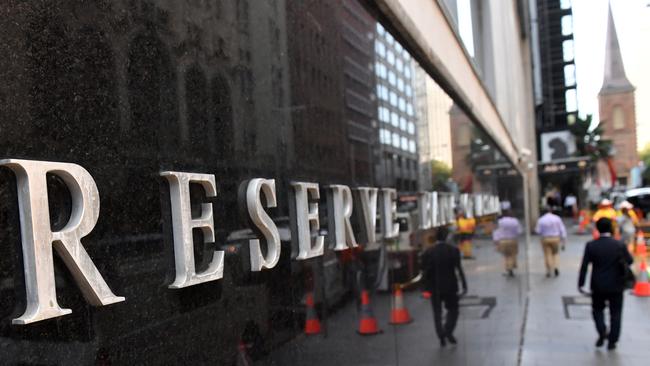Unintended consequences put squeeze on economy
The Australian economy is being hammered by a double dose of responsibility: responsible lending and responsible budgets.

The Australian economy is being hammered by a double dose of responsibility: responsible lending and responsible budgets.
Oh, the irony.
We have a credit squeeze and fiscal tightening at the wrong time — that is, into the teeth of a cyclical property downturn — because banks and governments were irresponsible for too long, and are now trying to atone for their sins by being responsible.
More broadly, Australia is reaping the result of having an economy based on real estate, resource exports and immigration, excluding manufacturing and ideas.
The nation’s economic health is hostage to the banks and China and there is an also a productivity-sapping infrastructure deficit that can’t be made up because state stamp duty revenues are now collapsing.
At a federal level, both major parties are campaigning on deficit reduction, and as a result, the RBA’s loose monetary policy is battling tight fiscal policy that’s happening because of the election, not in spite of it.
A series of decisions over at least three decades has brought us to this point: the cut in science and university funding, allowing a lot of large-scale manufacturing to close down when the exchange rate was temporarily high, reversing the 1985 decision to abolish negative gearing, increasing taxes on superannuation and thus pushing more people into leveraged property investments, doubling the immigration intake, and holding a royal commission into banking misconduct.
Those decisions and more have meant that Australia is uniquely vulnerable to the actions of banks and the health of the Chinese economy, neither of which can be relied upon, especially this year.
The property downturn has been deepened by withdrawal of the banks as lenders and Chinese investors as buyers; as a result, the correction has developed its own momentum, could go anywhere, and is now infecting the economy generally.
It’s partly about the level of house prices, which has a clear impact on consumer behaviour, but the main thing now is that the bank lending drought, initiated by APRA and then built on by the banks themselves responding to the royal commission, is reducing availability of credit for businesses.
In January, APRA published a review of the restrictions it imposed on bank lending between 2014 and 2018 that ended the property boom, and then added: “The changes that APRA has instituted to strengthen lending standards are intended to be permanent.”
In 2018, APRA was actually loosening its lending “benchmarks” while saying that the changes were permanent, but it was actually the royal commission into misconduct that helped make the strengthening of lending standards permanent by exposing the banks’ reliance on disembodied statistics to determine credit risk — specifically the Household Expenditure Measure. The banks have dumped HEM and moved to a much stricter interpretation of what “responsible lending” means, which they arguably should have done before, except now it’s happening in the midst of a property price correction.
Finally, there is the Labor Party’s plan to once again abolish negative gearing as part of its fiscal consolidation plans — this time on existing properties only, but the impact will be broad because new properties become existing ones as soon as they are sold.
Louis Christopher’s SQM Research has examined what happened when negative gearing was abolished between 1985 and 1987: there was “a sharp decline in commencements, a rise in rents for the majority of capital cities over and above CPI, a fall in sales turnover, a rise in rental yields and a fall in housing finance approvals”.
Christopher forecasts the ALP policy will result in a further 4-8 per cent decline in house prices and a rise of 7-12 per cent in rents over the next two or three years if, or rather when, it wins power.
This is not a matter of whether it is good or bad policy — Louis Christopher, for one, agrees with it, as do I. But it should be phased in gradually instead, he says, not imposed in one hit during a real estate downturn.
The other notable event this week was the speech by RBA assistant governor, Michele Bullock, urging banks to lend more and to take more risks: “The appropriate amount of credit risk is not zero — banks need to continue to lend and that will inevitably involve some credit losses.”
You really know you’re in trouble when the RBA is telling banks to take more risks.
To an extent, the central bank is now at odds with the bank regulator, because it is now carrying the whole burden of preventing a recession, but with the cash rate at 1.5 per cent it has very little room to move. What’s more, even 50 basis points of cuts, which now seems to be the consensus forecast of leading economists for this year, won’t make much difference since credit supply is the problem, not price.
And the RBA is also at odds with the government, because fiscal policy coming in as back-up looks remote. To ensure they are seen as responsible economic managers, neither major party is proposing to slow down the pace of fiscal consolidation and the return to surplus. That might change after the election, but it’s certain to be too late.
And so the economy is in the grip of irony: an attack of responsible bank lending has produced a credit crunch, and responsible budget management is removing the prospect of fiscal policy to offset it.
It means the RBA is fighting the war on its own, with very little ammunition, begging the banks to be less responsible and forced to cut rates from not much to even less, probably to zero effect.
Alan Kohler is editor in chief of InvestSMART



To join the conversation, please log in. Don't have an account? Register
Join the conversation, you are commenting as Logout